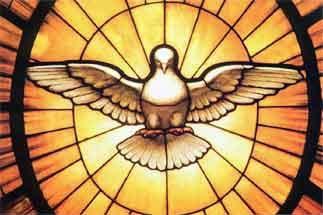Some people call Pentecost Sunday the birthday of the Church, but, while a lovely thought, that’s not entirely accurate. Today, the last day of the Easter season, we celebrate when the Church “goes public”: the frightened men in the upper room are emboldened by the Holy Spirit to go out and proclaim the Good News, and the Holy Spirit helps them to be understood. Some see this moment as reversing what happened at the Tower of Babel (Genesis 11:1-9): if the pride and hubris of men led them to division and misunderstanding, the Spirit of the Lord brings them back together again into one people. The places named in today’s First Reading by the astounded Jews are all places where, in turn, the Church spread, aided by the Holy Spirit.
Pentecost Sunday is a special day for celebrating the many gifts the Holy Spirit lavishes upon the Church. Throughout the Easter season we’ve seen the Spirit emboldening, instructing, dissuading, and strengthening the disciples as they started to spread the Gospel throughout the world. As St. Paul reminds us in today’s Second Reading, it is thanks to the Spirit that we are able to pray at all. Just as we are the Mystical Body of Christ, a Biblical image of the Church, the Holy Spirit is like the Soul of that Body, giving the Body form and life that makes the Church visible as a living thing, not just a conglomeration of people who agree on certain teachings, but a communion of life and love that wants to welcome everyone into the fold.
Pentecost Sunday is not just a day for celebrating all the Holy Spirit’s gifts that enable us to be in communion with each other; it is also a day for celebrating the Holy Spirit’s role in bringing us into and maintaining our communion with the Most Holy Trinity, which we’ll celebrate next Sunday. In today’s Gospel the Risen Lord gives the Apostles a special infusion of the Holy Spirit that helps them reconcile sinners with God or help people see when they haven’t. Without this reconciliation there is no communion, and without this communion, little by little, divisions and misunderstandings are sown, just as the tale of the Tower of Babel illustrates.
Let’s pray that the Holy Spirit continues to embolden, instruct, dissuade, and strengthen us in sharing the Gospel and fostering communion between each other and between God.
Readings: Acts 2:1–11; Psalm 104:1, 24, 29–31, 34; 1 Corinthians 12:3b–7, 12–13; John 20:19–23. See also Second Sunday of Easter, 2nd Sunday of Easter (Divine Mercy Sunday), Cycle C, and Pentecost Sunday.

